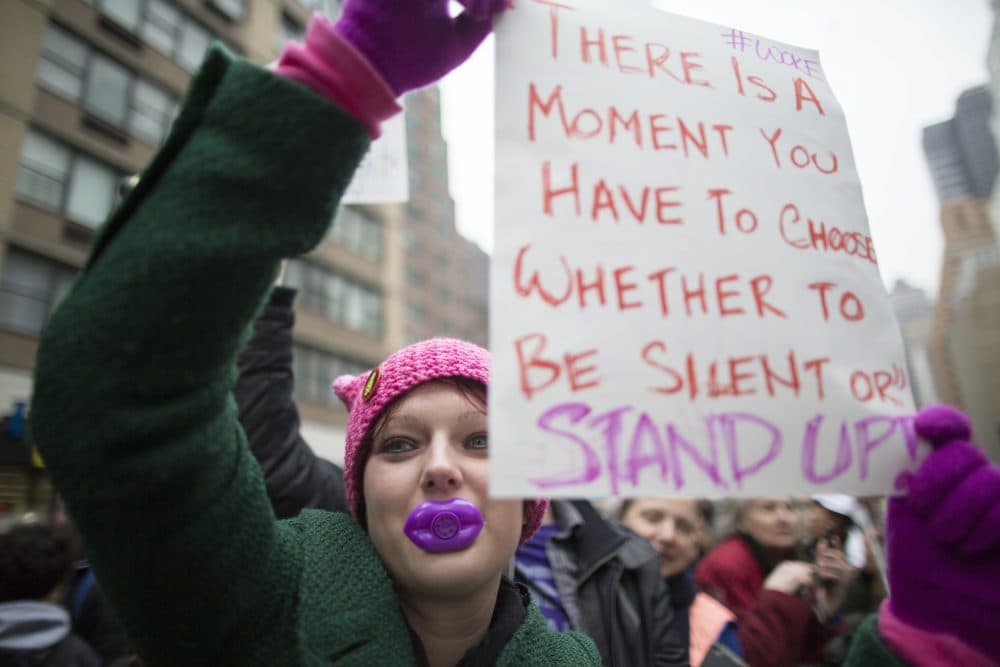Advertisement
Commentary
Not Your Mother's Feminism: Teen Vogue And The Next Wave Of Activism

“Fashion and feminism have long been perceived as antagonists, glaring at each other across the old Birkenstocks-versus-lipstick divide,” Katrina Onstad wrote a few years ago. She was referring to “Second Wave” feminism, the movement that arose in the 1960s and early 70s that critiqued traditional notions of femininity as inherently infantilizing, objectifying and oppressive.
Nowhere was the validity of that critique more evident than in women’s fashion magazines emblazoned with headlines about how to shed 10 years or 10 pounds or catch a guy, stuffed with ads for cosmetics and clothing and lingerie. The women featured in the stories and ads were always white, slender and straight, and their concerns rarely extended beyond how to win, date and dump a man, have lips that shine, or — in the Harvard Lampoon’s hilarious parody of Cosmopolitan, decorate those dowdy uterine walls.
Now, 50 years later, for boomer women like the one writing this column, there remains a fine line between self-expression and self-objectification. But it’s clear even to us that we as women have more important matters to discuss than whether we’re selling out or preserving the patriarchy every time we apply mascara. As Melanie, my 21-year-old niece, gently explained to me, “This [third] wave of feminism really tries to value typically feminine interests, like fashion, and so maybe women who felt less represented by the second wave now feel that they have more of a place in the feminist movement.”
It’s clear even to us that we as women have more important matters to discuss than whether we’re selling out or preserving the patriarchy every time we apply mascara.
Still, I was surprised and pleased to see one of the clearest, most cogent explanations of the perils of the Trump regime showing up in an op-ed in Teen Vogue. In her recent column, contributing editor Lauren Duca took on the administration’s attempts to undermine the press and “destabilize the truth.” “To be clear, the ‘us’ here is everyone living under Trump,” she wrote. “It's radical progressives, hardline Republicans, and Jill Stein's weird cousin. . . Trump took advantage of the things that divide this country, pitting us against one another, while lying his way to the Oval Office. Yes, everything is painfully clear in hindsight, but let’s make sure Trump’s win was the Lasik eye surgery we all so desperately needed.”
Duca wrote in a voice that’s true to the magazine’s demographic and editorial identity. She skillfully interwove Gen Y/Gen Z “weird cousin” language, straight-up activist prose (“pitting us against one another”), and the obligatory Lasik brand name. And a quick scan of a recent issue suggests a similar mix, featuring teen celebrity gossip, break-up/make-up sagas, fashion tips and politically charged first-person stories about sexuality, abortion and mental illness. But from “Troye Sivan's Cover Interview: On Queerness, Representation, and the Power of Music” to “Halima Aden Becomes the First Hijab-Wearing Model Signed to IMG” to “St. Tropez Self Tan Dark Bronzing Mousse Review” (billed as "The Non-Orange Self-Tanner Donald Trump Should Totally be Using") they all have an edge — sometimes defiant, sometimes merely sarcastic, but never, you know, girly-nice.
No, it’s assertive. Whether creating or merely reflecting the culture, Teen Vogue is tapping into a more outward-looking set of aspirations and concerns among a generation far more worldly than the one that read their mothers’ Vogue. Today’s teenage girls are more fluid in their sexual orientation, less tolerant of intolerance, and thanks to social media, have not just the confidence, but the means of sharing their beliefs and stories with the larger world. Even if their goal is still to catch that guy (or girl, or pronoun-defying person), they don’t have to rely on finding the perfect shade of lipstick to do it. They can broadcast themselves — their creations and aspirations and causes — on YouTube.
It's becoming clear to women's publications and advertisers that activism sells.
Perhaps that’s why, as my niece Melanie said, “Among girls and young women, activism has in some ways become an identity and a way of branding themselves, which is perhaps why activism sells better than sex.”
And there it is: the commercial argument for progressive politics finding this unlikely new home. Duca’s column was one of the more thorough and celebrated works of political journalism in a women’s magazine, but it’s hardly the first. Cosmopolitan, Vogue and Essence have all taken on the powers that be in recent months, and their ad sales don’t seem to have suffered as a consequence. On the contrary, big brands like Nordstrom (which attracted Trump’s ire for discontinuing Ivanka’s line, albeit for purely commercial reasons), Patagonia (which closed for election day so employees could vote and has pulled out of trade shows it deems environmentally unfriendly), Airbnb (which offered free accommodations to travelers barred from entering the United States under Trump’s ban) and Starbucks (whose CEO has pledged to hire 100,000 immigrants) are all becoming lightning rods for activists in general.
In the current climate, it’s clear both to publications and the advertisers subsidizing them that they can do well by doing good. Of course that trend may go the way of platform shoes and the whale spout pony tail. But Melanie and I, generations apart, both hope that it will not be merely (and transiently) fashionable to be a feminist.
